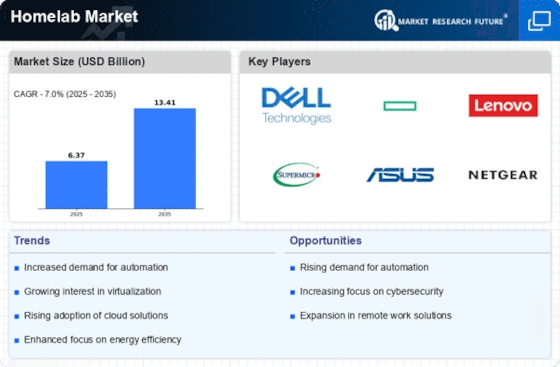Top Industry Leaders in the Homelab Market
Competitive Landscape of the Homelab Market
The homelab market, encompassing the equipment and software used to create personal laboratories within homes, is experiencing steady growth. Driven by a rising interest in technology, personal development, and readily available resources. This growth fosters a dynamic competitive landscape where established players and emerging companies vie for market share.
Key Players:
- Raspberry Pi Foundation
- NVIDIA Corporation
- Dell Technologies
- Intel Corporation
- AMD
- Synology Inc.
- Ubiquiti Inc.
- ASUS
- Hewlett Packard Enterprise
- Netgear Inc.
Competitive Strategies:
-
Product Innovation: Staying ahead of the curve with innovative hardware and software solutions is a key strategy for market leaders. Companies like Raspberry Pi Foundation are constantly updating their offerings with improved processing power, storage capacity, and connectivity options. Similarly, software companies are focusing on developing user-friendly interfaces and functionalities that cater to the diverse needs of homelab enthusiasts, from beginners to seasoned professionals.
-
Market Segmentation: Recognizing the varied needs within the homelab market, key players are increasingly focusing on market segmentation. This involves developing product lines that cater to specific user groups, such as hobbyists, students, and IT professionals. For instance, offerings like low-cost single-board computers target hobbyists for basic experimentation, while high-performance server solutions cater to IT professionals seeking to develop their skillsets or test professional applications.
-
Strategic Partnerships and Acquisitions: Collaboration between established players and niche solution providers is another trend gaining traction. Established companies can leverage the expertise of smaller firms to enhance their product portfolios and cater to a broader range of customer needs. Additionally, acquisitions allow established players to expand their market reach and incorporate innovative technologies.
Factors for Market Share Analysis:
-
Product Portfolio: The breadth and depth of a company's product portfolio significantly impact its market share. Companies offering a comprehensive range of hardware and software solutions catering to diverse needs are likely to hold a stronger position.
-
Brand Recognition: Established brands with a strong reputation for quality and reliability tend to have a loyal customer base and enjoy a competitive advantage.
-
Pricing Strategy: Finding the right balance between affordability and performance is crucial. Companies offering competitive pricing strategies, particularly for entry-level equipment, can attract new customers and expand their market reach.
-
Community Engagement: Building a strong and active community around a brand fosters customer loyalty and drives innovation. Companies that actively engage with their user base through forums, tutorials, and workshops can gain valuable insights into user needs and preferences, allowing them to refine their product offerings and strategies.
New and Emerging Companies:
The homelab market is witnessing an influx of new and emerging companies offering innovative solutions. These companies often specialize in niche areas, such as open-source hardware development, cloud-based homelab solutions, or pre-configured homelab bundles. This trend fosters healthy competition and drives innovation within the market.
Investment Trends:
Companies across the homelab market spectrum are actively investing in research and development to stay ahead of the curve. This includes advancements in hardware miniaturization, energy efficiency, and software functionalities. Additionally, there's a growing focus on user experience, with companies investing in developing user-friendly interfaces and educational resources to make homelabs more accessible to a wider audience.
Latest Company Updates:
-
Rise of Open-Source Software: Ongoing trend - The increasing popularity of open-source software like Proxmox and XCP-ng provides free and powerful virtualization platforms for homelabs.
-
Cloud Pricing Fluctuations: Constantly monitored by IT professionals - Cloud service pricing fluctuations can influence the decision to run some applications on a homelab for cost-effectiveness.
-
Focus on Energy Efficiency: A growing trend - Energy efficient components like ARM processors are becoming more attractive for homelabs due to rising electricity costs.











